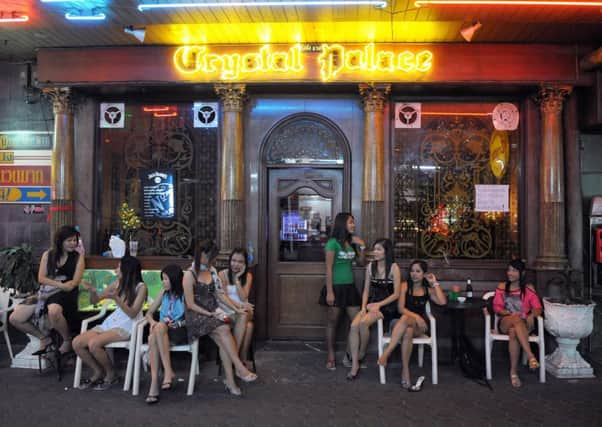Bangkok’s street girls hit by junta’s crackdown


The new junta yesterday ordered members of the government to turn themselves in, while troops dispersed protesters who attempted to defy a ban on demonstrations.
At least two activists were detained in downtown Bangkok, as a protest descended into scuffles but ended without injury – one of the first open challenges to the military since Thursday’s coup.
Advertisement
Hide AdAdvertisement
Hide AdThe junta, though, remained in charge, summoning more than 100 top political figures –the entire ousted government, their associates and a handful of their opponents. It also banned those on its wanted list from leaving the country. Among the officials who showed up at an army compound in Bangkok by midday were former prime minister Yingluck Shinawatra, sacked earlier this month for nepotism by the Constitutional Court, and her replacement Niwattumrong Boonsongpaisan.
After about 30 minutes, Miss Shinawatra left the facility and was taken to another army location by soldiers.
It was unclear what the military’s intentions were beyond the summons, which it said had been issued “to keep peace and order and solve the country’s problems”.
By nightfall, dozens of the VIPs were still being held, although at least eight ex-cabinet ministers had been released.
Most of Thailand was calm, and there was little military presence on Bangkok’s streets. Although life had largely returned to normal during the day, a curfew from 10pm to 5am remains in effect.
There were no reports of any unrest, including in the former government’s political strongholds in the north. In the north-east city of Chiang Mai, about 100 demonstrators also took to the streets, but no violence was reported and the protesters dispersed on their own.
The army staged the coup just after a military-hosted meeting of political rivals to resolve the country’s political deadlock.
After two hours and no resolution, armed soldiers detained the participants, including four ministers, and army chief General Prayuth Chan-ocha appeared on national television to announce the takeover. Hours later, the junta suspended the constitution and banned gatherings of more than five people. He justified the coup as a necessary move to restore stability.
Advertisement
Hide AdAdvertisement
Hide AdBut there are fears the power grab will only lead to more violence and deepen the current crisis, which has left 28 people dead and more than 800 wounded since November.
Thursday’s dramatic events were the latest response to a societal schism laid bare after a 2006 coup deposed former prime minister Thaksin Shinawatra, the older brother of Miss Shinawatra and a billionaire tycoon whose populist movement has won every national election since 2001.
He lives in self-imposed exile to avoid corruption charges, but he still wields enormous influence over Thailand’s political affairs.
Yesterday US Secretary of State John Kerry said: “There is no justification for this military coup.” He said America was reviewing its aid to Thailand.
British Foreign Secretary William Hague urged the Thai army, “to set out a quick clear timetable for elections to help re-establish the democratic framework of governance”.